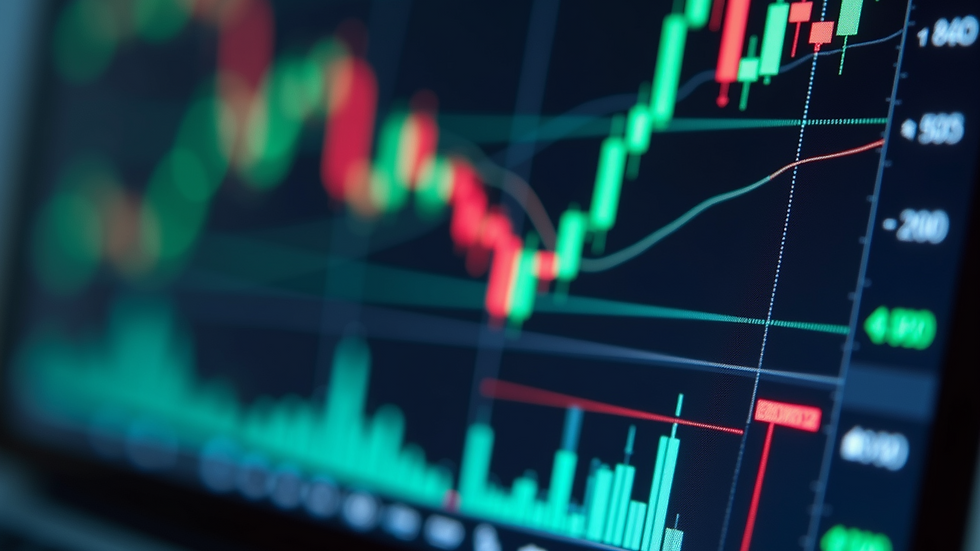Mastering Market Psychology: Staying Calm During Forex Volatility
- forex368

- Jul 11
- 4 min read
The Forex market is often defined by its rapid movements and unpredictability. In times of heightened volatility, traders face significant challenges—not just from market conditions, but from their own psychology. Staying calm in the face of uncertainty is a skill that every successful trader must develop.

Today’s market conditions, driven by speculation around the upcoming Jackson Hole symposium and central bank decisions, serve as a prime example of how emotions can interfere with trading strategies.
Today’s Market Context: Heightened Volatility Ahead of Jackson Hole
The global markets have been highly volatile leading up to today’s events. Overnight, the US stock markets experienced a retreat, with the Nasdaq falling 1.13%, the S&P 500 down 0.63%, and the Dow Jones losing 0.45%.
Investors are on edge, reducing their positions ahead of key updates from central bankers like Fed Chair Jerome Powell. Treasury yields have surged, and the US dollar has regained ground, all while oil prices reversed a five-day losing streak.
For Forex traders, this level of uncertainty presents both opportunities and risks. The anticipation surrounding Powell’s speech has caused ripples across global markets, and traders must navigate the psychological pressure that comes with such volatility.
Whether you're new to trading or a seasoned pro, staying calm and sticking to your strategy is vital. Here’s how you can master market psychology during volatile times.
1. Recognize the Emotional Triggers
Volatility can amplify emotions like fear, greed, and anxiety. In moments like today, when major economic events loom large, these emotions are heightened. The anticipation of Powell’s speech has led to pre-emptive moves across the market, with traders positioning themselves based on expected outcomes.
However, speculation can lead to overreactions, which is why it’s important to recognize when your emotions are taking over.
For example, fear might prompt you to exit trades prematurely, while greed might encourage overleveraging in anticipation of a market shift. The key is to recognize these emotional triggers before they influence your decision-making. When you notice feelings of anxiety, pause and evaluate whether your actions are based on strategy or emotion.
2. Stick to Your Plan
During periods of uncertainty, the most successful traders are those who stick to their predefined trading plans. A well-thought-out trading plan includes entry and exit points, risk management rules, and a clear understanding of market conditions. If you’ve designed a plan that accounts for potential volatility, like today’s events surrounding Jackson Hole, then trust in that plan.
For instance, if the US dollar spikes following Powell's speech, you may feel tempted to chase the momentum. However, doing so without adhering to your strategy could expose you to unnecessary risk. By sticking to your plan, you avoid making knee-jerk reactions that could negatively impact your trades.
3. Practice Patience
Patience is perhaps the hardest discipline for traders to master, especially during volatile periods. As today’s markets demonstrate, there is often a rush to act based on news and speculation. However, patience can help you wait for the right opportunities, rather than forcing trades in uncertain conditions.
For example, instead of reacting immediately to Powell’s remarks, consider observing how the market digests the information over the course of several hours or even days. This approach allows you to avoid the initial emotional reaction of the market and make more informed decisions based on trends and data rather than pure speculation.
4. Manage Your Risk
Managing risk is critical when trading in volatile markets. One of the most effective ways to do this is by using stop-loss orders and adjusting your position sizes to account for increased market movement. As US Treasury yields climb and oil prices rise, traders are seeing shifts in the forex market. The key to staying calm is ensuring that you’ve limited your downside risk.
For instance, during today’s trading session, the US dollar has gained ground following earlier weakness, impacting currency pairs like EUR/USD. If you’re trading in this environment, set stop-losses at strategic levels to protect your capital if the market moves against you.
5. Stay Informed, But Don’t Overreact
It’s important to stay informed during key economic events like the Jackson Hole symposium. However, overloading yourself with too much information can lead to over-analysis and decision paralysis. Instead of reacting to every piece of news, focus on the big picture and how it aligns with your trading plan.
For example, traders are anticipating potential rate cuts from the Federal Reserve, but the details will only become clear after Powell’s speech. Rather than making impulsive trades based on rumors or partial information, wait for clarity and ensure your decisions are based on data rather than speculation.
Conclusion: Master Your Emotions to Master the Market
Mastering market psychology is crucial to succeeding in Forex trading, particularly in times of volatility like today. With central bank updates dominating the headlines and speculation running high, staying calm and disciplined is more important than ever.
By recognizing your emotional triggers, sticking to your trading plan, practicing patience, managing your risk, and staying informed, you can navigate turbulent markets with confidence.
Remember, the market will always present challenges, but it’s how you respond to those challenges that will determine your success as a trader. In times of volatility, your mindset is your most powerful tool.





